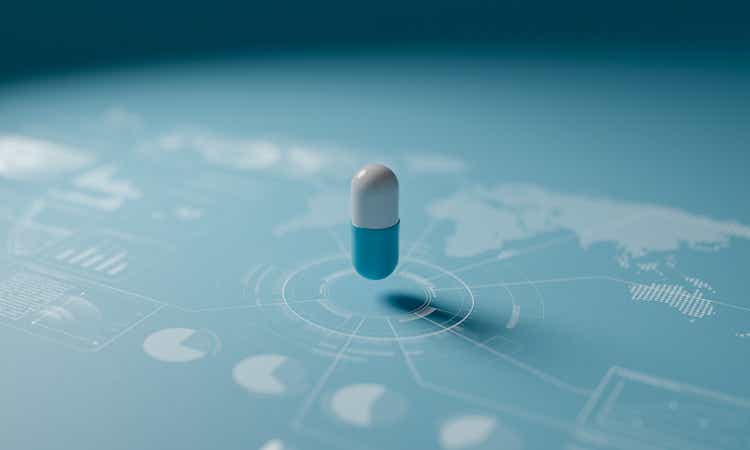ClaudioVentrella/iStock via Getty Images
Deals and Financings
SystImmune, the Seattle arm of Chengdu’s Biokin Pharma, out-licensed global rights (ex-China) for a bispecific ADC to Bristol Myers Squibb (BMY) in a $8.4 billion agreement (see story). SystImmune will procure $800 million upfront and up to $500 million in contingent near-term payments. The candidate, BL-B01D1, is a bispecific topoisomerase inhibitor-based ADC that targets both epidermal growth factor receptor and human epidermal growth factor receptor 3 (EGFRxHER3). It is currently in a global multi-center Phase I research for patients with metastatic or unresectable non-small cell lung cancer (‘NSCLC’). Biokin partners SystImmune with OrbiMed, a US-China biopharma investor.
Evive Biotech, a Yifan Pharma subsidiary developing novel biological drugs, formed an antibody discovery collaboration using Boston’s Nona Biosciences Harbour Mice® antibody technology platform. The two companies will work together to speed up the process of antibody discovery and drug development. Founded in 2004, Evive intends to bring innovative drugs from China to the world. The company applies its proprietary technology platforms to advance innovative drug candidates for oncology, inflammatory and metabolic diseases. Nona is a wholly-owned subsidiary of HBM Holdings, which has its headquarters in Boston with drug discovery operations in Rotterdam and laboratories in Shanghai.
Shanghai Fosun Pharma (OTCPK:SFOSF) reported that the Japan-based Global Health Innovative Technology Fund (GHIT Fund) will contribute $3.3 million to maintain a global Phase III clinical trial of a novel malaria therapy (see story). Fosun’s triple artemisinin combination drug (Artemether-Lumefantrine-Amodiaquine fixed-dose formulation) is designed to overcome artemisinin partial resistance (ART-R), which has become a problem in two geographical areas: the Greater Mekong Subregion of Southeast Asia and to a lesser extent in several African countries, including Rwanda and Uganda. Because malaria occurs mostly in children, the project also developed a child-friendly version.
Trials and Approvals
Suzhou CStone Pharma (OTCPK:CSPHF, HK: 2616) announced its anti-PD-L1 mAb was approved in China as a first-line therapy for esophageal squamous cell carcinoma (see story). The approval was the fourth for sugemalimab (Cejemly®) in China and the first approval globally for a PD-L1 product as a first-line ESCC therapy. CStone filed a supplemental biologics license application for sugemalimab in combination with fluorouracil and platinum-based chemotherapy in unresectable locally advanced, recurrent or metastatic esophageal squamous cell carcinoma. The approval was the 13th NDA approval for CStone.
Suzhou OSAI Biopharma announced that its Phase III clinical trial of a vaginal L. crispatus live bacteria capsule (Lc262-1) met its primary endpoints of reducing bacterial vaginosis (‘BV’). The company selected a strain of L. crispatus, Lc262-1, from the vaginal microbiota of healthy Chinese women to make the microbiome product. After receiving seven days of oral metronidazole and vaginal LBP or a placebo, cured patients were followed up for three months, showing resistance to recurrence. In Asian women of childbearing age. Lactobacillus crispatus is the core bacterial genus that maintains the balance of vaginal flora. OSAI develops live biotherapeutic products.
Shanghai Alebund Pharmaceuticals announced positive Phase II proof-of-concept results for its investigational drug, AP306, a first-in-class, pan-inhibitor of sodium-dependent phosphate transporters. Elevated phosphorus levels are a common problem for kidney patients on dialysis. At the end of AP306 treatment, the reduction of serum phosphorus from baseline was clinically significant; and the response rate (serum phosphorus lower than 5.5 mg/dL) for AP306 was much higher than for sevelamer carbonate, an existing therapy. Detailed results will be released in an upcoming scientific meeting. Alebund in-licensed global rights to the candidate from Chugai Pharma (OTCPK:CHGCF), including Japan.
Connect Biopharma (CNTB) reported positive topline results from the global Phase IIb trial for rademikibart, a next-gen interleukin-4 receptor alpha (IL-4Rα) inhibitor, in adult patients with moderate-to-severe persistent asthma. The trial met its primary endpoint by improving forced expiratory volume over one second (FEV1) during 24 weeks of treatment at two dose levels. The double-blind, placebo-controlled trial enrolled 322 patients in 79 sites in the US, Poland, Hungary, China and South Korea.
Disclosure: None.
Editor’s Note: The summary bullets for this article were chosen by Seeking Alpha editors.
Editor’s Note: This article discusses one or more securities that do not trade on a major U.S. exchange. Please be aware of the risks associated with these stocks.



